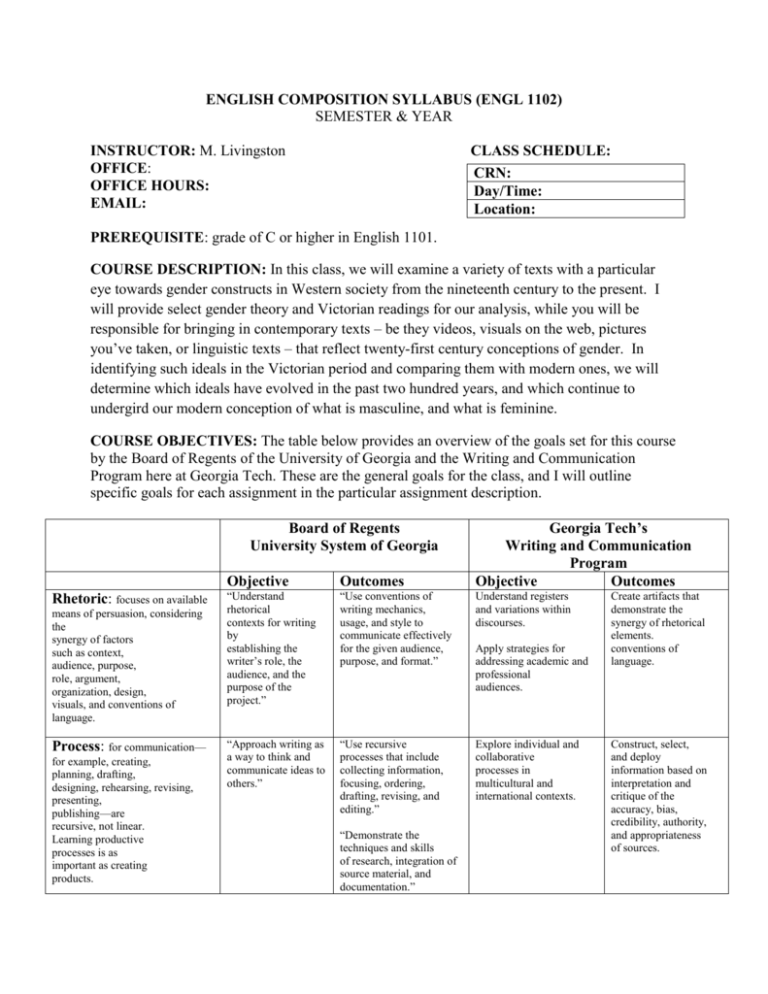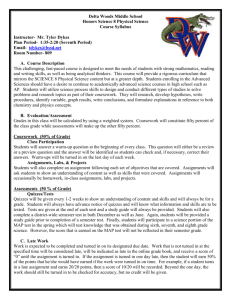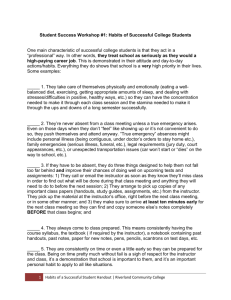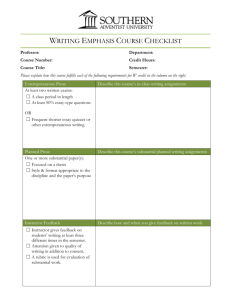Proposed Syllabus
advertisement

ENGLISH COMPOSITION SYLLABUS (ENGL 1102) SEMESTER & YEAR INSTRUCTOR: M. Livingston OFFICE: OFFICE HOURS: EMAIL: CLASS SCHEDULE: CRN: Day/Time: Location: PREREQUISITE: grade of C or higher in English 1101. COURSE DESCRIPTION: In this class, we will examine a variety of texts with a particular eye towards gender constructs in Western society from the nineteenth century to the present. I will provide select gender theory and Victorian readings for our analysis, while you will be responsible for bringing in contemporary texts – be they videos, visuals on the web, pictures you’ve taken, or linguistic texts – that reflect twenty-first century conceptions of gender. In identifying such ideals in the Victorian period and comparing them with modern ones, we will determine which ideals have evolved in the past two hundred years, and which continue to undergird our modern conception of what is masculine, and what is feminine. COURSE OBJECTIVES: The table below provides an overview of the goals set for this course by the Board of Regents of the University of Georgia and the Writing and Communication Program here at Georgia Tech. These are the general goals for the class, and I will outline specific goals for each assignment in the particular assignment description. Board of Regents University System of Georgia Rhetoric: focuses on available means of persuasion, considering the synergy of factors such as context, audience, purpose, role, argument, organization, design, visuals, and conventions of language. Process: for communication— for example, creating, planning, drafting, designing, rehearsing, revising, presenting, publishing—are recursive, not linear. Learning productive processes is as important as creating products. Georgia Tech’s Writing and Communication Program Objective Outcomes Objective Outcomes “Understand rhetorical contexts for writing by establishing the writer’s role, the audience, and the purpose of the project.” “Use conventions of writing mechanics, usage, and style to communicate effectively for the given audience, purpose, and format.” Understand registers and variations within discourses. “Approach writing as a way to think and communicate ideas to others.” “Use recursive processes that include collecting information, focusing, ordering, drafting, revising, and editing.” Explore individual and collaborative processes in multicultural and international contexts. “Demonstrate the techniques and skills of research, integration of source material, and documentation.” Apply strategies for addressing academic and professional audiences. Create artifacts that demonstrate the synergy of rhetorical elements. conventions of language. Construct, select, and deploy information based on interpretation and critique of the accuracy, bias, credibility, authority, and appropriateness of sources. Modes & Media: Activities and assignments should use a variety of modes and media— written, oral, visual, electronic, and nonverbal—singly and in combination. Contexts and cultures of modes and media are critical. “Adjust writing to a variety of contexts, including electronic environments.” “Read and respond to various texts for purposes of interpretation, analysis, synthesis, evaluation, and judgment.” Distinguish and evaluate multimodal communication — WOVEN (Written, Oral, Visual, Electronic, and Nonverbal). Create WOVEN artifacts that demonstrate interpretation, analysis, synthesis, evaluation, and judgment. REQUIRED TEXTS: (Obtain the edition indicated; no other editions will be acceptable.) Groner, Rachael, and John F. O’Hara. Composing Gender: A Bedford Spotlight Reader. Boston: Bedford/St. Martin’s, 2014. Print. Dickens, Charles. The Mystery of Edwin Drood. Edition TBD. Hardy, Thomas. Jude the Obscure. Edition TBD. Georgia Tech e-Book (best price by purchasing at (http://ebooks.bfwpub.com/gatech.php) Other Texts (located on Desire2Learn (D2L)) or Online: You are expected to bring an electronic copy to class on the day we discuss each work, or to print out a copy and bring to class on the day we discuss each work. o Arola, Kristin L., Jennifer Sheppard, and Cheryl E. Ball. Writer/Designer: A Guide to Making Multimodal Projects. Boston: Bedford/St. Martin’s, 2014. [Selected Essays from] o Young, Iris Marion. On Female Body Experience: “Throwing Like a Girl” and Other Essays. Oxford: Oxford UP, 2005. Print. [Selected Essays from] o Street Harassment Video. “10 Hours of Walking in NYC as a Woman.” Online video clip. YouTube. YouTube, 28 Oct. 2014. Web. 20 Dec. 2014. o Red Pill Philosophy. “Saying Hi To a Woman = Harassment? Yes According to Feminists.” Online video clip. YouTube. YouTube, 29 Oct. 2014. Web. 20 Dec. 2014. ASSIGNMENTS: Participation Daily Work including Homework and In-Class Work, Class Discussion, Reading Responses, Conferencing, and Quizzes Percentage 15% Major Projects #1 Identifying Victorian Age Gender Constructs in Fiction [Essay] 20% 15% 20% #2 Timeline Project – examining the Legal & Cultural Shifts that Impact Gender Construction – Groups will choose to focus on Evolving Dress, Education, Career, or Legal Opportunities for (Wo)Men. [Visual] #3 The Modern Media’s Construction of Gender – What does it mean to be (Wo)Manly in 21st Century America? [Podcast] #4 Do You Realize? Website - Exposing Implicit Gender Norms [Digital] 30% GRADING: A+ A 97-100 94 - 96 A– 90 - 93 B+ 87 - 89 B 84 - 86 B80 – 83 C+ 77 - 79 C 74 – 76 D 70 - 73 F 0 - 69 RUBRICS: Major assignments will be graded with the use of a rubric that is available to you on ULearn. Minor assignments may be graded with a rubric or holistically. CLASS WORK AND DISCUSSION: You are expected to attend each class prepared to discuss and engage with the materials presented. Please be aware, if you have not done your assigned reading and/or writing, you are not adequately prepared for class. If I discover you have not done your reading on any day, you will be counted absent. THE MAJOR PROJECTS: The five major assignments you will complete during the course of this class will give you the opportunity to practice and refine your communication skills in a variety of modes, each with their own affordances. For example, in the first assignment, you will construct a text you are already highly familiar with: the academic essay. In the construction of this text you will show your mastery of the following: Production of a strong and unique thesis statement; Logical organization; Academic research; Explication; Consideration of the Antithesis; MLA Style and Citing appropriately; and Use of standard American English and mechanics. The second assignment will build on the objectives of the first assignment, and ask you to collaboratively translate the skills you have shown linguistically into a visual medium. In particular, you will be asked to create a timeline in a medium of your choosing. I will be looking to see that you have communicated information and ideas differently than when you were using only verbal language. The third assignment asks you to take on another medium, the Podcast, and in this project you will show your proficiency using Aural modes of communication. As with the second assignment, I expect to see similar techniques as those showcased in assignment one (a clear point, organization, research, explication, consideration of alternative points of view, credit given to your sources, and the use of SAE), but I will also be looking to see that you have used the alternative affordances allowed you by the medium to the fullest extent. Just as your second assignment should not be an essay copy and pasted into sections on a screen with pictures, your third project should not feature an essay read aloud into a microphone. Finally, you will utilize all modes of communication – Linguistic, Visual, Aural, Gestural, and Spatial – in the production of a website for your final project. This project will show your mastery of Written, Oral, Visual, Electronic, and Nonverbal modes of communication. Late Work: Minor and Daily Work: I do not accept any late or made-up minor/home/daily work. Major Papers and Projects: If you anticipate a problem with a particular deadline, please confer with me at least one day before the assignment due date to discuss the issue. Conferring with me beforehand may spare your paper a grade deduction. Otherwise, I will accept a major assignment after class through midnight of the same day a paper is due for a five point deduction. Anytime through midnight of the next day is an additional five points, and so forth. EXTENSIONS: When I grant you an extension, you will have extra time to complete your assignment and I will not deduct points for the extra time. Obviously, then, it is in your best interest to ask me for an extension when you realize you will not be able to complete an assignment on time instead of submitting it late for a grade deduction. I will grant an extension only: For a major paper or assignment; When you ask me for one at least 24 hours before it is due; When you have a reasonable justification for needing extra time; When you have not already been granted an extension on a previous paper; and When I deem your request reasonable. INCOMPLETES: Receiving an Incomplete: The notation of “I” may be given to a student who, for nonacademic reasons beyond his or her control, is unable to meet the full requirements of a course. In order to qualify for an “I”, a student must: Have completed most of the major assignments of the course (generally all but one); and Be earning a passing grade in the course (aside from the assignments not completed) in the judgment of the instructor. When a student has a nonacademic reason for not completing one or more of the assignments for a course, including examinations, and wishes to receive an incomplete for the course, it is the responsibility of the student to inform the instructor in person or in writing of the reason. A grade of incomplete is awarded at the discretion of the instructor and is not the prerogative of the student. Conditions to be met for removing a grade of incomplete are established by the instructor. CONFERENCES: Every student will participate in a one-on-one conference with me at some point in the semester. A class during the semester has been eliminated in order to provide time for attendance. You will sign up for a conference date. Attendance is mandatory. ATTENDANCE: First four absences: No penalty, but note that you will not be allowed to make up any work missed. Each additional absence: I will subtract three points from your Final Grade. Tardiness: Being tardy to class is rude to your classmates (as your entrance interrupts a class they have already begun) and to me. Three tardies will count as ONE of your four permitted absences. o If you are late to class, it is your responsibility to see me directly after that class so I can mark your presence in the roll book; otherwise, you will be considered absent for that day. You are tardy if you arrive in class after I have taken roll. You are responsible for everything that goes on in class whether you are present or not. You should introduce yourself to a couple of other students in the class and obtain their contact information so that in the event you must miss class, you can find out what you missed. ACADEMIC HONESTY AND PLAGIARISM: Plagiarism, or taking credit for the words and/or ideas of others without properly crediting them, is dishonest, unethical, and in some cases illegal, and thus, absolutely, entirely, unequivocally, one hundred percent unacceptable. Do your own work and give credit where credit is due. If I find that any portion of any work you submit in this class has been plagiarized, you will receive a “0” for the assignment. (Note that this would make it very difficult to pass the course. Lesser penalties may be imposed at the instructor’s discretion.) I will also report you to the Communications Department and/or College for Academic Fraud. Students should be familiar with the section on Academic Honesty in the student handbook and should feel free to consult me if they have any further questions. Examples: You may be guilty of plagiarism or academic dishonesty if you: Use identical, or very similar language, to communicate another person’s idea(s) without giving that individual proper academic credit. Use another person’s idea(s) without giving that individual proper academic credit. Copy and paste (from anything) except in the use of quotations, and where those quotations are properly cited. Fail to cite properly. Make use of any unauthorized aid in the completion of graded work for this class. Collaborate with someone else on an assignment, unless authorized by me. Falsify or fabricate information (for example, in citing your sources). Submit work to this class that you produced for another class. DISABILITY SERVICES: Georgia Tech complies with the Americans with Disabilities Act and Section 504 of the Rehabilitation Act. No retroactive accommodations will be provided in this class. If you have a documented disability and anticipate needing accommodations in this course, please make arrangements to meet with me soon, preferably in the first week of the semester or as soon as you become aware of your need for accommodation. Prior to our meeting, if you have not already done so, please request that ADAPTS staff verify your disability and specify the accommodation you will need. DISCRIMINATION AND HARASSMENT: Georgia Tech does not discriminate on the basis of race, color, age, religion, national origin, sex, marital status, disability, or status as a U.S. veteran. This class adheres to those guidelines. Alternative viewpoints are welcome in this classroom. However, statements that are deemed racist, sexist, classist, or otherwise discriminatory toward others in the class will not be tolerated. No form of harassment or discrimination is allowed in this class. In keeping with the professional nature of this course, only professional behavior is acceptable between the instructor and the students and between students. No harassment of any kind is allowed in class including but not limited to gender, age, ability, religion, sexual orientation, and ethnicity. COMMUNICATE WITH ME: If you have any concerns, issues, or difficulties about anything regarding this class, come and speak with me after class or send me an email at any time. I check my email at least once every day so this is an excellent way to contact me. Many times larger problems can be avoided by talking to me early. EMAIL: When contacting any of your professors via email, remember to use appropriate email etiquette: Be sure to include a meaningful subject line; this helps clarify what your message is about and may also help the recipient prioritize reading your email. Just like a written letter, be sure to open your email with a greeting like Dear Dr. Jones, or Ms. Smith: Use standard spelling, punctuation, and capitalization. THERE'S NOTHING WORSE THAN AN EMAIL SCREAMING A MESSAGE IN ALL CAPS. Write clear, short paragraphs and be direct and to the point; professionals and academics alike see their email accounts as business. Read through your email before sending it to make sure that your message is clear and that you haven't made any serious grammatical mistakes. This syllabus reflects a general plan for the course. Deviations from this syllabus may become necessary as the semester progresses. Students are responsible for taking note of any changes that may occur. I reserve the right to alter the guidelines set forth in this Syllabus under any circumstances I deem appropriate.







